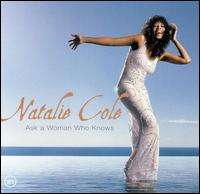Ask a Woman Who Knows
Ask a Woman Who Knows is a 2002 jazz album by vocalist Natalie Cole, with guest Diana Krall, and receiving four Grammy Award nominations.
| Ask a Woman Who Knows | ||||
|---|---|---|---|---|
 | ||||
| Studio album by | ||||
| Released | September 17, 2002 | |||
| Recorded | 2002 | |||
| Genre | Jazz | |||
| Label | Verve | |||
| Producer |
| |||
| Natalie Cole chronology | ||||
| ||||
| Review scores | |
|---|---|
| Source | Rating |
| AllMusic | |
| Vibe | |
Background
Courtesy of the Clayton-Hamilton Orchestra, Cole projects her aura on to songs once recorded previously by great singers like Nina Simone, Sarah Vaughan, Ella Fitzgerald, Dinah Washington, Peggy Lee, Carmen McRae, Barbra Streisand, Diana Ross, Frank Sinatra, and Nat "King" Cole. Natalie Cole's musical choices include songs that depict the various aspects of love—its joy, its sorrow, its loneliness, and its consolation. Included are two of Dinah Washington's gems -- "I Haven't Got Anything Better to Do" and the title track, "Ask a Woman Who Knows"—both songs about love gone wrong. Cole changes the tone of the set with great scatting on the up-tempo swinger "My Baby Just Cares for Me"; big band swing "It's Crazy," the hit by her father, Nat King Cole; and the soulful "I'm Glad There Is You," which features Roy Hargrove on flugelhorn. Natalie Cole sings her engaging musical stories with priceless, nuanced phrasing accompanied by a distinguished core quintet of Joe Sample, Russell Malone, Christian McBride, Lewis Nash, and Rob Mounsey. The added dimension of Natalie Cole performing all background vocals and the backing of the Clayton-Hamilton Orchestra on two songs makes the recording extra special. Overall, this is an exceptional recording that re-teams her with Tommy LiPuma, the producer of her biggest hit, Unforgettable: With Love. "Better Than Anything" is a jazz waltz devoted to "women shopping, guest vocal Diana Krall in perfect agreement that spending money is the best thing in life ("better than honey on bread, better than breakfast in bed" —lyrics by Bill Loughborough), better than anything except being in love. "I'm Glad There Is You," Latin-influenced ballad from 1941 by Jimmy Dorsey. "Calling You" is an Academy Award-nominated song from the Bagdad Café (1987) film. "My Baby Just Cares For Me," the only standard here whose title is immediately recognizable, introduced in 1928 by singer Eddie Cantor, best known as the signature tune of singer and pianist Nina Simone.[3]
Commercial performance
Ask a Woman Who Knows debuted at No. 1 on Billboard's Top Jazz Albums chart an has sold more than 252,000 copies in the United States, according to Nielsen SoundScan.[4][5]
Track listing
| No. | Title | Writer(s) | Length |
|---|---|---|---|
| 1. | "I Haven't Got Anything Better To Do" | Lee Pockriss, Paul Vance | 4:07 |
| 2. | "Tell Me All About It" | Michael Franks | 4:10 |
| 3. | "Ask a Woman Who Knows" | Victor Abrams | 4:14 |
| 4. | "It's Crazy" | Timmie Rogers, Tim Fields | 2:10 |
| 5. | "You're Mine, You" | Johnny Green, Edward Heyman | 4:03 |
| 6. | "So Many Stars" | Sérgio Mendes, Alan Bergman, Marilyn Bergman | 5:16 |
| 7. | "Told You So" | Duncan Lamont | 3:52 |
| 8. | "Soon" | George Gershwin, Ira Gershwin | 3:13 |
| 9. | "I'm Glad There Is You" | Jimmy Dorsey, Paul Madeira | 5:16 |
| 10. | "Better Than Anything" (Duet with Diana Krall) | David Wheat, Bill Loughborough | 3:35 |
| 11. | "The Music That Makes Me Dance" | Jule Styne, Bob Merrill | 4:09 |
| 12. | "Calling You" | Robert Telson | 5:00 |
| 13. | "My Baby Just Cares for Me" | Walter Donaldson, Gus Kahn | 4:26 |
Personnel
- Natalie Cole - vocals
- Diana Krall - vocals
- Roy Hargrove - flugelhorn
- Larry Bunker - vibraphone
- Gary Foster - alto saxophone, tenor saxophone
- Alan Broadbent, Joe Sample - piano
- Rob Mounsey - keyboards
- Russell Malone - guitar
- Christian McBride - bass guitar
- Lewis Nash - drums
- Tollak Ollestad - harmonica
- The Clayton-Hamilton Orchestra, performed on Grammy winning albums for Dianne Reeves, Diana Krall, Benny Carter, Frank Sinatra, and Barbra Streisand. The three main musicians are John Clayton, his brother, Jeff Clayton, and Jeff Hamilton.[6]
Accolades
Grammy Awards
| Year | Nominee / work | Award | Result |
|---|---|---|---|
| 2003 | Ask A Woman Who Knows | Best Jazz Vocal Album | Nominated |
| "I'm Glad There Is You" | Best Instrumental Arrangement Accompanying Vocals | Nominated | |
| "Better Than Anything" (with Diana Krall) | Best Pop Collaboration With Vocals | Nominated | |
| Ask A Woman Who Knows | Best Engineered Album - Non-Classical | Nominated |
Charts
Weekly charts
| Chart (2002) | Peak position |
|---|---|
| US Billboard 200[7] | 24 |
| US Top R&B/Hip-Hop Albums (Billboard)[8] | 24 |
| US Top Jazz Albums (Billboard)[9] | 1 |
References
- AllMusic review
- Album reviews at CD Universe
- About Jazz: Ask A Woman Who Knows
- Billboard review
- Billboard chart history
- The Clayton-Hamilton Orchestra Archived February 14, 2008, at the Wayback Machine
- "Natalie Cole Chart History (Billboard 200)". Billboard. Retrieved July 31, 2020.
- "Natalie Cole Chart History (Top R&B/Hip-Hop Albums)". Billboard. Retrieved July 31, 2020.
- "Natalie Cole Chart History (Top Jazz Albums)". Billboard. Retrieved July 31, 2020.